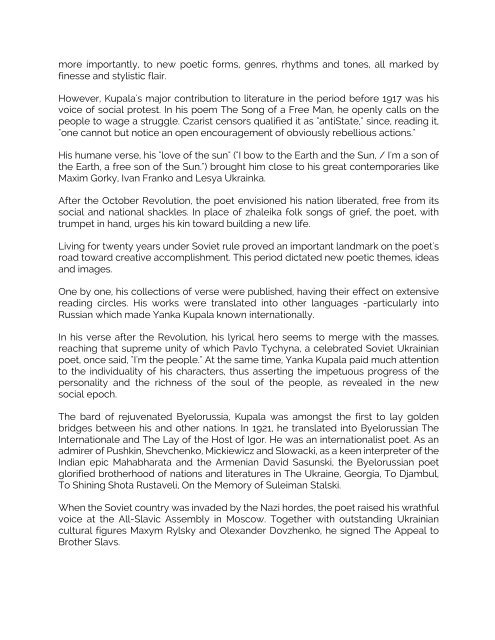PoetsGardenArrowParkNY_dl
You also want an ePaper? Increase the reach of your titles
YUMPU automatically turns print PDFs into web optimized ePapers that Google loves.
more importantly, to new poetic forms, genres, rhythms and tones, all marked by<br />
finesse and stylistic flair.<br />
However, Kupala's major contribution to literature in the period before 1917 was his<br />
voice of social protest. In his poem The Song of a Free Man, he openly calls on the<br />
people to wage a struggle. Czarist censors qualified it as "antiState," since, reading it,<br />
"one cannot but notice an open encouragement of obviously rebellious actions."<br />
His humane verse, his "love of the sun" ("I bow to the Earth and the Sun, / I'm a son of<br />
the Earth, a free son of the Sun.") brought him close to his great contemporaries like<br />
Maxim Gorky, Ivan Franko and Lesya Ukrainka.<br />
After the October Revolution, the poet envisioned his nation liberated, free from its<br />
social and national shackles. In place of zhaleika folk songs of grief, the poet, with<br />
trumpet in hand, urges his kin toward building a new life.<br />
Living for twenty years under Soviet rule proved an important landmark on the poet's<br />
road toward creative accomplishment. This period dictated new poetic themes, ideas<br />
and images.<br />
One by one, his collections of verse were published, having their effect on extensive<br />
reading circles. His works were translated into other languages -particularly into<br />
Russian which made Yanka Kupala known internationally.<br />
In his verse after the Revolution, his lyrical hero seems to merge with the masses,<br />
reaching that supreme unity of which Pavlo Tychyna, a celebrated Soviet Ukrainian<br />
poet, once said, "I'm the people." At the same time, Yanka Kupala paid much attention<br />
to the individuality of his characters, thus asserting the impetuous progress of the<br />
personality and the richness of the soul of the people, as revealed in the new<br />
social epoch.<br />
The bard of rejuvenated Byelorussia, Kupala was amongst the first to lay golden<br />
bridges between his and other nations. In 1921, he translated into Byelorussian The<br />
Internationale and The Lay of the Host of Igor. He was an internationalist poet. As an<br />
admirer of Pushkin, Shevchenko, Mickiewicz and Slowacki, as a keen interpreter of the<br />
Indian epic Mahabharata and the Armenian David Sasunski, the Byelorussian poet<br />
glorified brotherhood of nations and literatures in The Ukraine, Georgia, To Djambul,<br />
To Shining Shota Rustaveli, On the Memory of Suleiman Stalski.<br />
When the Soviet country was invaded by the Nazi hordes, the poet raised his wrathful<br />
voice at the All-Slavic Assembly in Moscow. Together with outstanding Ukrainian<br />
cultural figures Maxym Rylsky and Olexander Dovzhenko, he signed The Appeal to<br />
Brother Slavs.


